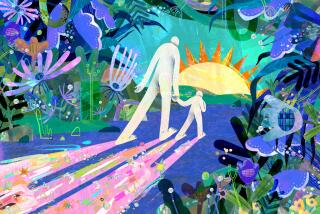No Wonder : Somewhere Between First and 12th Grades, We Become Less Inclined to Consider, Contemplate and Question--Mainly Because We Don’t Like to Admit We Don’t <i> Know</i>
- Share via
AS I HAVE FOR the past several years, I begin the New Year by extracting a few inspirational quotes from the annual calendar published by the RAND Corp., the nonprofit Santa Monica think tank.
Coming at a time when one is likely to be suffering post-holiday fatigue and New Year anxiety, it should be as easy to swallow as Alka-Seltzer, and it may also serve to restore one’s equilibrium, reinforce one’s values and set one’s compass for the months ahead.
The quotation for January is inspiring enough, it seems to me, for the whole year. It is from Chief Standing Bear’s testament, “Land of the Spotted Eagle,” published in 1933, and it reminds us of the wonderful wonder and insight of childhood.
“Very early in life the child began to realize that wisdom was all about and everywhere and that there were many things to know. There was no such thing as emptiness in the world. Even in the sky there were no vacant places. Everywhere there was life, visible and invisible, and every object possessed something that would be good for us to have also--even to the very stones. This gave a great interest to life. Even without human companionship one was never alone.”
Certainly that is an antidote to the feeling of emptiness, alienation and anomie that many of us feel today, especially on the threshold of a new year.
What happens to that wonder, the sense of life and fullness and discovery that seems to be every child’s birthright?
Writing in the Skeptical Inquirer, Carl Sagan argues that the propelling force of science is wonder. “It’s a very powerful emotion,” he says. “All children feel it. In a first-grade classroom everybody feels it; in a 12th-grade classroom almost nobody feels it; or at least acknowledges it. Something happens between the first and 12th grades, and it’s not just puberty . . . .”
Remember when you used to wonder?
Why was the sky blue? Why did water always run downhill? Why did the moon shine? Where did frost come from? Why did bees sting? Where did God live?
I think Sagan is right that something happens between the first and 12th grades to suppress wonder, and it isn’t just puberty. Of course, puberty does have its effect on adolescents, just as the moon has its effects on the seas. The questions that adolescents might ask themselves are so painful, so poignant, so unanswerable, that they tend not to ask at all but pretend to know the answers. As Sagan suggests, it isn’t so much that they don’t wonder but that they don’t want to acknowledge wondering. Not to know the answers is a sign of inadequacy, and no teen-ager will admit to inadequacy.
It is almost impossible, in the first place, to get teen-agers to admit they are interested in anything but themselves, their closest friends and their idols, and it is hard to get them to admit that there is anything they don’t know or need to know.
We gather, from the test scores of college students, that the young no longer wonder about the geographical world they live in. Some don’t know that the country to our south is Mexico; some can’t even find the United States on a world globe. With the intellectual and emotional guidance and support of rock music and teen movies, today’s teen-agers may not be moved to wonder, since they are instructed in everything by their peers.
The loss of wonder may also be partly the parents’ fault. Glued to TV themselves, they have long since quit asking the questions, and if their children ask them, they don’t listen, much less answer.
Wasn’t it Gertrude Stein who said that the important thing to consider was not “What is the answer?” but “What is the question?”
James Thurber said, “It is better to know some of the questions than all of the answers.”
It seems to me that I wondered until late in my teens. I remember that, one summer when I was running away, I lay on a boxcar and looked at the stars, wondering who I was and why I was here and whatever would become of me. Those are still good questions, and I don’t have the answers to them yet. I rarely ask them anymore, though. And I am not even concerned with the major question of whether there is a God and whether he cares about me.
I am inclined to think, though, that he doesn’t, or he wouldn’t have let me get lost in Spain.






